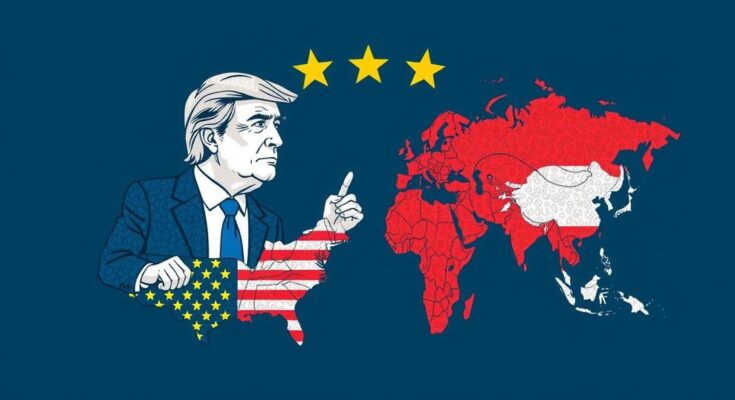The upcoming U.S. election has raised significant fears regarding foreign policy and global stability. If Donald Trump were to be re-elected, his past actions and policies could endanger international alliances, particularly in Europe and Asia. Countries are preparing for potential changes in American foreign relations, especially concerning support for Ukraine, as well as implications in the Middle East and with China. While Harris could bring more stability and responsibility, the risk of a second Trump presidency could lead to extensive negative global consequences, making this election pivotal.
The upcoming U.S. election is casting a long shadow over global foreign policy, raising fears that a return of Donald Trump to the presidency would be detrimental to international stability. Josep Borrell, the European Union’s foreign affairs chief, articulated a troubling reality when he stated that Europe must prepare for the potential of war, cautioning that European nations may no longer be able to count on American support under a Trump administration. Trump’s past remarks suggesting that he would encourage Russia to act against NATO allies who do not meet defense spending commitments exacerbate these concerns. Allied nations in Asia are reacting similarly; Japan’s defense budget is on the rise, and South Korea is grappling with calls for an independent nuclear deterrent. These shifts illustrate an anxiety among allied nations about the potential implications of a Trump victory in the electoral battleground states, with concerns particularly prevalent regarding Ukraine. Trump’s longstanding admiration for autocrats, as well as his inconsistent positions on support for Ukraine, indicate a potential departure from established U.S. foreign policy. In the Middle East, while Vice President Kamala Harris has exhibited a slightly more sympathetic stance towards Palestinians than President Joe Biden, there is little evidence that her approach to policies concerning Israel will differ significantly. The support for Israel appears steadfast, with leaders like Prime Minister Benjamin Netanyahu looking favorably upon a Trump presidency, given Trump’s previous support for the Israeli right and his withdrawal from the Iran nuclear agreement. Under Trump’s presidency, the international landscape grew increasingly perilous, notably due to the escalated nuclear ambitions of North Korea and its growing ties with both China and Russia. The Biden administration has retained some elements of Trump’s tough stance toward China, but it does so within a framework that contrasts sharply with Trump’s stark economic nationalism, which has the potential to ignite a global trade war. While the Democrats have adjusted their immigration policies rightward, Trump’s past actions and rhetoric have fostered an atmosphere of division and hostility. Ms. Harris is perceived as lacking the same deep emotional connection to issues such as Israel-Palestine relations or European alliances as her boss, yet she has publicly pledged her support for Ukraine, albeit suggesting a more conciliatory approach to Russia is conceivable. Conclusion: If elected again, Donald Trump’s policies could unravel international norms, fostering instability and conflict. Contrastingly, Harris, while not without flaws, could bring a measure of stability and responsibility to foreign relations. The imperative for the global community is clear: the potential ramifications of another Trump administration are unacceptable. The world is at a critical crossroads; thus, it cannot afford to gamble on a return of Trump’s unpredictable and divisive policies.
The looming U.S. presidential election holds significant implications for global foreign policy, particularly concerning established alliances and international security. Under Donald Trump’s previous administration, foreign relations became increasingly unpredictable, with a shift towards isolationism and a disregard for traditional international agreements. With key figures like Josep Borrell warning of the ramifications for European defense and security, the global community is acutely aware of the stakes involved in the upcoming election, particularly regarding support for Ukraine amidst ongoing conflict and tensions with Russia. The reactions of U.S. allies in Asia are similarly telling, highlighting a rising concern about the United States’ commitment to its role as a global leader depending on who occupies the White House. As the election approaches, the choices made by American voters will resonate beyond U.S. borders, affecting diplomatic relations and the potential for conflict worldwide.
The potential re-election of Donald Trump poses a significant risk to both U.S. foreign policy and global stability. His historical conduct and unpredictable nature have made international allies wary, potentially leading to greater instability and conflict. Conversely, the consistency and potential for stability associated with a Vice President Kamala Harris administration seem preferable from a global perspective. In light of these dynamics, the world cannot afford a second term for Trump, as the implications of such an outcome could be profoundly destructible.
Original Source: www.theguardian.com




